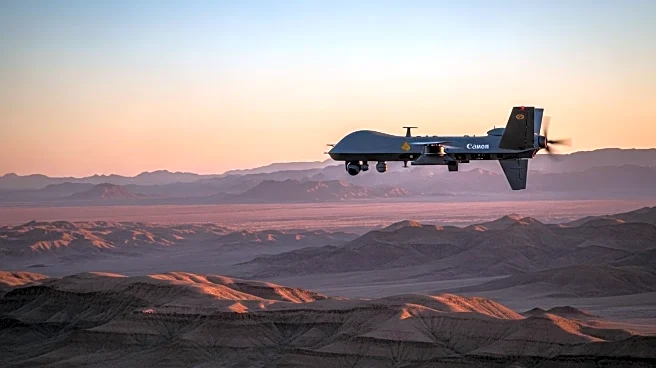What is the story about?
What's Happening?
President Trump has authorized military strikes against boats he claims were involved in drug smuggling operations, resulting in the deaths of 17 individuals. These actions have sparked controversy due to the lack of evidence provided by Trump to justify the killings, as well as potential legal implications for U.S. service members who carried out the orders. The military destroyed three boats, which were reportedly too small to travel long distances without refueling, raising questions about the validity of Trump's claims. Legal experts have expressed concerns that these actions may violate both civil and military laws, as the individuals targeted were not enemy combatants nor posed a direct threat to U.S. forces. Despite these concerns, the Pentagon has stated that the operations were vetted by department lawyers, although details about the strikes remain scarce.
Why It's Important?
The military strikes ordered by President Trump have significant implications for U.S. military policy and international law. The use of lethal force against suspected drug smugglers without due process challenges established legal norms and could set a precedent for future military actions. This approach raises ethical and legal questions about the use of military power and the potential for abuse of executive authority. The actions could also impact U.S. relations with other countries, particularly if similar tactics are adopted by other nations. Furthermore, the lack of transparency and legal justification for these strikes may undermine trust in U.S. military operations and provoke criticism from both domestic and international observers.
What's Next?
The controversy surrounding President Trump's military strikes is likely to continue as lawmakers and legal experts seek more information and clarification on the legal basis for these actions. Congressional inquiries and potential legal challenges may arise as the administration faces pressure to justify the use of lethal force. The situation could lead to debates on the limits of presidential authority and the need for checks and balances in military operations. Additionally, the international community may respond with concern over the precedent set by these actions, potentially affecting diplomatic relations and cooperation on drug trafficking issues.
Beyond the Headlines
The broader implications of President Trump's actions include potential shifts in U.S. military policy and the role of executive power in authorizing military operations. The strikes highlight the tension between national security interests and adherence to international law, raising questions about the balance between security and human rights. The situation also underscores the importance of transparency and accountability in military operations, as well as the ethical considerations of using lethal force in non-combat situations. These developments may influence future policy decisions and shape the discourse on the use of military power in addressing global challenges.















